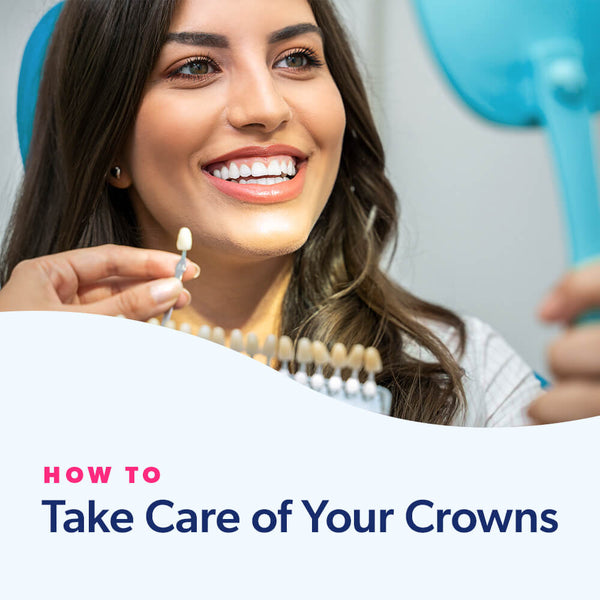
How to Take Care of Your Crowns
A dental crown is a tooth-shaped cap a dentist places over a tooth that has been damaged by an accident or tooth decay. A crown is designed to protect what's left of the damaged tooth, improve your overall appearance and make it easier to chew and talk.
Whether you've had a dental crown for years or a new one has just been placed, it's important to take care of your crown to prevent damage. On average, a dental crown lasts about 10 years. Taking care of your crowns can extend their life and prevent discomfort or damage. Caring for a crown isn't complicated, but there are some important things to know and do if you want to keep your crown strong as long as possible.
Why Is It Important to Take Good Care of a Crown?
Crowns can be made from porcelain, metal, stainless steel, resin or ceramic materials. Although these materials are strong and the crown is designed to function in place of the tooth it covers, even the strongest crown cannot match the strength of a natural tooth in good condition. Since dental crowns aren't the same as real teeth and they don't last forever, there are two big reasons to take good care of your crown:
1. Protect Your Oral Health
A crown covers a real tooth in your mouth. If your crown is not in good shape, it cannot protect your mouth from bacteria and damage. A damaged crown can allow a buildup of bacteria to reach the damaged tooth underneath it and the other teeth around it. A buildup of bacteria in your mouth can also lead to bad breath, tooth decay and a number of other dental problems. Poor oral hygiene has been linked to a number of serious health conditions, such as stroke, cardiovascular disease and bacterial pneumonia.
2. Protect Your Investment
Dental crowns cost a significant amount of money. In some cases, insurance may cover part or all of the procedure. However, less than one-third of adults over the age of 65 have dental insurance. If you've spent money on a crown, you've invested a lot in your oral health. Taking good care of the crown can extend its life and ensure you don't have to pay that amount of money again for a long time.
How to Take Care of Dental Crowns
When your dentist first tells you that you'll need a crown, they will likely fit you with a temporary crown while your permanent crown is being made. Even while you have a temporary crown in place, it's important to begin practicing good crown maintenance.
The best way to care for a temporary crown is to eat and brush as you normally would and avoid flossing. Flossing around a temporary crown can disrupt the temporary cement holding it in place. The crown may then become dislodged, causing more discomfort. Some patients also find their teeth are more sensitive with a temporary crown in place, so you may want to avoid eating extremely cold or hot foods during this time.
Once your permanent crown is in place, it's important to learn how to care for a new crown. These tips aren't just something to follow for the first few weeks. They are designed to help you cultivate new habits that will last many years:
1. Nix Those Bad Habits
If you're prone to chewing your fingernails, ice, pens or anything other than food, now is the time to say "so long" to those bad habits. Chewing on hard items can put too much pressure on your crown, putting it at greater risk of chipping, cracking or breaking. It can also loosen the crown, exposing the remaining tooth underneath to bacteria and putting you at risk for tooth decay and infection.
2. Develop and Maintain Good Habits
Although most parents are good about teaching their children to brush twice a day, many adults don't take their own advice. In fact, evidence has shown that a significant number of adults aren't brushing and flossing consistently, leading to an increased risk of tooth decay and other oral health problems.
If you have a crown, be sure to brush twice a day and floss every day. You should also rinse your mouth with an antibacterial mouthwash every day. Mouthwash is designed to provide antibacterial protection to the crevices in your mouth that are difficult to reach with a toothbrush.
Good oral health is about more than brushing and flossing. It's also about paying careful attention to what goes into your mouth. Tooth decay occurs when the bacteria in your mouth come into contact with a lot of sugar. So it's important to limit the amount of sugary foods and beverages you consume on a regular basis. Avoid candies, cookies, cakes and sugary sodas in excess.
Instead, drink lots of water and consume plenty of foods from the five major food groups. Be especially careful to avoid consuming food or beverages with a lot of sugar right before bedtime, when the sugars and food residues may stay on your teeth overnight. If you do consume sugar, be careful to brush as soon as possible.
3. Use a Night Guard
If you're prone to grinding your teeth at night, a night guard can protect your teeth and crown. It does this by putting a barrier between your top and bottom teeth, preventing the enamel and crown material from being worn down by frequent grinding. This can also help prevent your crown from popping off after being exposed to grinding over time.
Even if you don't think you grind your teeth, it's important to talk with your dentist about this to determine whether you need to use a mouth guard. In some cases, dentists can find signs you are grinding your teeth, including worn tooth enamel and teeth that appear to be flattened, cracked or chipped for no obvious reason.
4. Make Dental Checkups a Priority
Maintaining a regular series of checkups is even more important if you have a crown. With consistent checkups twice a year, your dentist can inspect the crown and identify potential problems before they become serious.
When it comes to how to care for permanent crowns, It's also important to talk with your dentist if you're experiencing sensitivity, pain or discomfort around your crown. This may be a sign the crown is placed too high up on the tooth or that it's become loose and the tooth underneath is decaying more.
If you suspect your crown has been damaged, don't wait to see your dentist. Waiting too long can potentially expose your teeth to harmful bacteria and put you at risk for infection. Waiting may also exacerbate the damage on the crown and make it less likely it can be repaired instead of replaced.
5. Learn How to Floss With a Crown
When you have a crown, it's important to floss everyday. However, there's a specific way it should be done in order to protect your crown and get optimal results. Making a C shape, slide the floss around the sides of the crown and your other teeth. Avoid a pulling and snapping motion because this might accidentally dislodge the crown.
Things to Avoid When You Have a Crown
It's important to avoid certain things when you have a crown, including the following:
1. Hard or Sticky Foods
This advice applies to people without crowns, but it becomes even more important when you have a crown in your mouth. Hard, tough or sticky foods such as nuts, candy, gum and ice can pull or push at your crown and put it at risk of popping out or being damaged over time.
Although it might seem obvious that you should avoid nuts and gum, there are some less-obvious foods that may cause damage to dental crowns such as steak, dried fruits, crunchy vegetables and popcorn. Some of these foods, like steak, are difficult to consume because they can be tough to chew if not cooked properly. This means you may need to be vigilant about eating tender cuts of meat. Other foods, such as gum and carrots, may be better to avoid altogether.
2. Extreme Food Temperatures
When you first receive your new crown, you may notice your teeth are especially sensitive to extreme temperatures. This is normal, and most patients find it goes away after a short period of time. As much as possible, avoid foods that are very hot or cold. For example, allow your coffee or tea to cool before you drink it. Avoid biting into an ice cream bar or popsicle, and definitely don't chew on ice. Your dentist may advise you to use a toothpaste designed for tooth sensitivity to ease your discomfort while your mouth adjusts to the new crown.
If your crown is not new and you notice a growing sensitivity to hot or cold foods, it's important to contact your dentist. In some cases, it may not be a problem, but a sudden onset of tooth sensitivity can also be a sign of a problem with the tooth underneath the crown, such as infection. Your dentist can identify the source of your discomfort and treat it properly. If there isn't an obvious cause, they can offer suggestions for how to ease the discomfort of tooth sensitivity.
3. Abrasive Toothpastes and Brushes
There are a number of toothpastes and toothbrushes on the market today that contain abrasives derived from chalk, silica, charcoal or other elements. This includes most whitening toothpastes, as well as the more recent trend of charcoal toothpastes and brushes.
These kinds of toothpastes and brushes are essentially designed to dissolve or scrape away at plaque and residue on your teeth that may be causing them to yellow. Although many dentists are cautious about using these products on natural teeth, they can cause a much bigger problem for someone with a crown. Why? Your teeth's natural enamel can stand up to these products much better than a crown can.
If you have a crown, it's best to stay away from abrasive toothpaste and opt for a non-abrasive variety. Not sure how to tell if your toothpaste is abrasive? Check the packaging for the American Dental Association (ADA) Seal of Acceptance, or find its rating online.
Maintaining Good Oral Hygiene With Crowns
The most important way to protect the integrity of your dental crown is to practice good crown dental care. Proper brushing and flossing can help prevent bad breath, tooth decay, staining and periodontal disease. What does a proper dental hygiene routine look like?
- Brushing twice a day with a fluoride toothpaste.
- Flossing once a day.
- Routine dental checkups every six months
Even if you haven't been as diligent with brushing and flossing in the past, it's never too late to cultivate healthy habits. With dental crown cleaning, be sure to pay careful attention to the area around your crown. Keeping this area clean can help to prevent bacteria from getting underneath the crown.
Your dentist can also advise you on using an electric toothbrush and other tools to achieve healthy teeth and gums. Products for taking care of crowns, such as EverSmile's dental implant cleaner OmniFoam, are designed to target the marginal areas around a crown to prevent the formation of plaque and bacteria.
What Problems Can Arise With Dental Crowns?
Without careful maintenance and care, you may run into certain problems with dental crowns over time. The potential problems you might encounter include the following:
1. Loose Crown
Your permanent crown is secured in place using cement. Sometimes that cement can wash away, leaving the crown loose and inviting bacteria underneath the crown. When bacteria get under the crown, they can cause further decay to the tooth that's been covered. The most obvious sign that a crown is loose is when it wobbles.
Unlike your natural teeth, you may see the crown move easily when you put pressure on it. Other signs your crown is loose include pain or sensitivity that wasn't there before, food getting stuck at the gumline around the crown, or cracks in the crown itself. If your crown is loose, call your dentist. In many cases, they can tighten it or reapply cement to position it firmly in place. If you wait too long, the crown may become damaged and require a replacement.
2. Sensitivity or Discomfort
It's normal to experience some discomfort or sensitivity to hot or cold foods in the days after your crown is put into place. This is common if the tooth the dentist put a crown on still has a nerve inside of it. These sensations should fade as your body adjusts to having a crown.
If your crown isn't new and you're still experiencing these sensations, it may signal a problem with the placement of the crown. If you experience discomfort when you bite down on food, it may mean the crown was placed too high on your tooth. It may also signal infection or another problem with the tooth underneath the crown. If you notice an increase in discomfort that wasn't there before, this could also signal the crown has come loose.
3. Chips
Crowns made from porcelain are particularly susceptible to chipping. In some cases, it's possible to repair the chip. However, if it's left unaddressed for too long or it is a big chip, the crown will likely need to be replaced. It's important to avoid biting down on hard foods or chewing on fingernails, pens, ice and other hard items. It's also important to use a night guard to protect your teeth against nighttime grinding.
4. Dark Line Along Your Gumline
If your crown is metal with a porcelain overlay, you may notice a dark line forming at the place where your crown meets your gumline. This does not signal a problem with the tooth itself, but it's not cosmetically appealing, and it may require your dentist to replace the crown with one made with a non-metallic material. Your dentist can confirm this problem and discuss your options for correcting it.
5. Allergic Reaction
Although rare, some patients may experience an allergic reaction to the metal in their crown. It's best to notify your dentist about potential metal allergies prior to the crown's placement, but if you begin to experience symptoms of an allergic reaction, contact your doctor or dentist immediately.
The best way to avoid an allergic reaction is to talk with your dentist before the crown is put in place. Be sure to disclose any known allergies to metal or other dental products so your dentist can advise you on the best options for your mouth.
6. Crown Comes Off
If the cement under the crown becomes loose or the tooth underneath decays further, it may cause your crown to fall off. Although this might seem alarming at the time it happens, remember this isn't uncommon and it can be fixed. If your crown comes off, call your dentist immediately to schedule a visit.
If they can't fit you in immediately, they will provide instructions for cleaning and temporarily replacing the crown using an over-the-counter tooth cement or dental adhesive. Once you see your dentist, they will determine whether your existing crown can be replaced or if a new one needs to be made.
Taking Care of Dental Crowns With EverSmile
At EverSmile, we're committed to creating products that help you care for your teeth and gums throughout your life. Our products are designed to keep you feeling confident with fresh breath and clean white teeth every day. In addition to our OmniFoam for crowns and implants, we also offer a variety of products to clean braces and aligners, as well as on-the-go cleaning for dentures and more.
EverSmile was started by a dental team who wanted to find ways to help patients keep their mouths healthy and fresh when they were wearing aligners. Over the years, EverSmile has expanded its product lines, but our commitment to healthy teeth and gums is stronger than ever. In today's busy world, we know you may not always be at home when you need to clean your dental appliances or products. That's why our products are designed to be user friendly and easy to carry wherever you go.
Whether you just got a dental crown or you've had one for years, it's never too late to take control of your oral health. Browse our products online today!
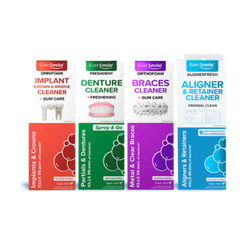
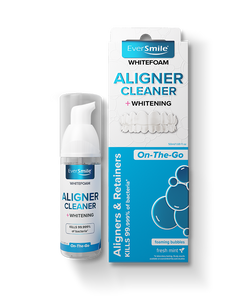
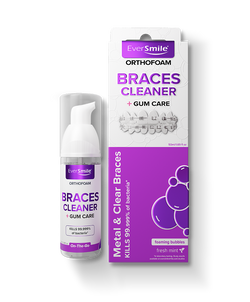
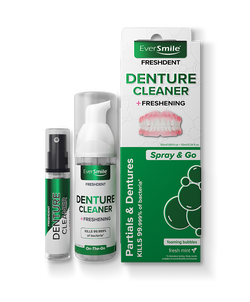
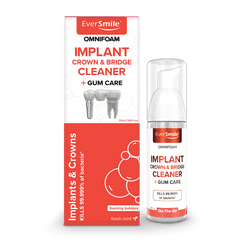
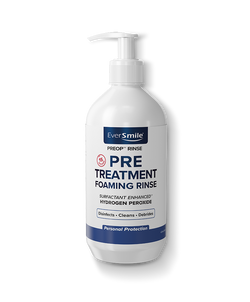

Post a Comment!